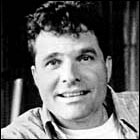
The line of studiously disheveled hipsters stretches down the stairwell, out the door, and onto East 4th. These are hardened literary groupies, a rare and often solitary species – much like the legendary author who’s reading tonight at KGB. Many are clutching first editions of Jesus’ Son, Denis Johnson’s acclaimed 1992 collection of short stories about a drug-demented American grifter, which earned him cult status as the quintessential “writer’s writer,” spiritual heir to William Burroughs, Charles Bukowski, Dylan Thomas – and inspiration to younger writers like Dave Eggers, Junot Diaz, and George Saunders.
Inside, Johnson, a stocky, famously reclusive guy, is hunched into a corner behind a small podium, poring over notes. A Wall Street Journal reporter sidles up next to him. “Do you mind signing these?” he asks, hauling out a series of Johnson first editions from a ragged backpack. Johnson’s first play to be produced in New York, Shoppers Carried by Escalators Into the Flames, goes into previews this week at the Dimson Theatre. Hence this appearance – or is it an apparition? – in the city. “I decided I’m going to be a good boy,” he says. “I’m going to learn how to interact with people.”
Johnson once described himself as a “criminal hedonist” turned “citizen of life.” Or, as he puts it over a recent grilled-chicken sandwich: “I was addicted to everything. Now I just drink a lot of coffee.” Then, in a soft voice you have to lean in to hear, he tells of his lengthy love affair with chemical substances, which started with rum at age 14. His father, who worked for the State Department, was stationed in the Philippines – a place where there is no such thing as underage. “When I was 21, I went into my first psych ward for alcohol.” Drugs followed, heroin included. “But I was not a constant junkie. You can’t just go into a drugstore and say, ‘I’ll have some heroin, please.’ You have to be prepared to enter into all kinds of adventures that I wasn’t strong enough for.”
Along the way, he acquired some literary – and alcoholic – mentors. While a student at the University of Iowa, he drank regularly with a professor named Raymond Carver. He drank through his first marriage, drank because he felt “all crawly without it,” drank until he was hospitalized again. And again. “I was actually concerned about getting sober – this is typical of people who feel artistic,” he says. “They feel if they get away from drugs and that crazy life, they won’t be writing as much, won’t have the inspiration.”
But in his case, it was a moot point: “I finally figured it only meant I’d be writing three paragraphs less a year, because I’d only written two stories and 37 poems in about a decade.”
Johnson had no trouble being productive without the bottle. In 1983, he published his first novel, Angels, a beautifully tragic chronicle of two down-and-out travelers that won him fans like Don DeLillo, who admired their “lonely spaces and stunned lives.” He continued to produce novels to small acclaim, leaving his reclusive northern-Idaho home only to take on journalistic assignments in places like Somalia, Afghanistan, and Liberia.
Jesus’ Son was an act of literary desperation. There had been a second divorce and a call from the IRS asking him to please pay the $10,000 he owed. Bankrupt, Johnson turned to some “memories” he’d jotted down years back – vignettes of his drug-abusing past that he never considered publishing – and sent them to The New Yorker. To his surprise, several were accepted. Fortified with $4,000, Johnson contacted Jonathan Galassi, his editor and the president of Farrar, Straus & Giroux. “I told him, ‘I’ll make you a book of short stories; all you have to do is pay off the IRS.’ ” Two years later, when the book was delivered, it was half the promised length. “Galassi was really disappointed. He was never really able to like the book.” (Galassi recalls it differently: “I actually think the length is part of its rightness. The book is an incredible masterpiece.”)
With Shoppers, Johnson brings his familiar dystopic terrain to the stage, along with something new for the author: American popular culture – which comes in the form of a television that talks back to the actors. “At this stage in my life, I spend a lot more time watching TV than I do reading.” He likes to end the day watching Jay Leno, Jon Stewart, and Conan O’Brien.
But, as in all his work, the subtext is religious. Johnson describes himself as a Christian – but hardly a conventional one. “I’m sure you could find any number of Christians who could assure me that I’m going to hell.”
Still, it’s what fuels his work. “What I write about is really the dilemma of living in a fallen world, and asking: Why is it like this if there’s supposed to be a God?” He also knows this can sound a whole lot like weirdo balderdash, which is why he chooses to view it with a sense of humor. “I have a feeling God finds us pretty funny,” he says. Then he pauses. “But that’s probably all the speaking I should do for God – he doesn’t go around talking about me.”